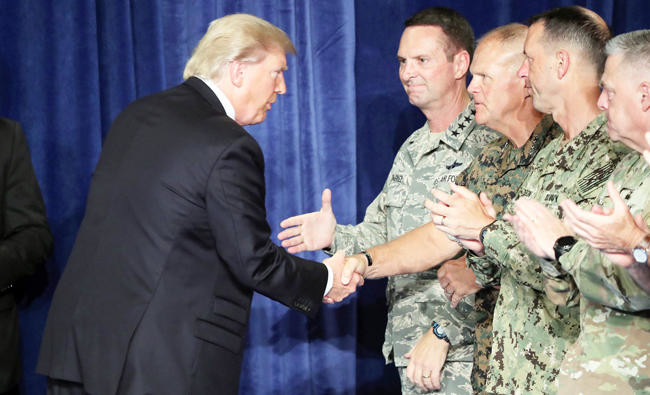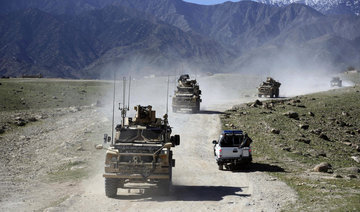ISLAMABAD: Political and military leaders in Afghanistan, Pakistan and India spent Tuesday digesting and analyzing Donald Trump’s sharp policy U-turn on US strategy in Afghanistan and South Asia.
In a televised address from Virginia on Monday night, the US president reversed his previous position that a US military presence in Afghanistan was “a complete disaster” and a waste of American money and lives.
Instead, he said, while the US was no longer involved in nation building, he would approve plans by his military chiefs to increase the number of US troops. He provided no figures, but analysts expect the numbers in the region to increase from 8,400 to about 12,400.
“Our troops will fight to win,” Trump said. “From now on, victory will have a clear definition: attacking our enemies, obliterating Daesh, crushing Al-Qaeda, preventing the Taliban from taking over the country, and stopping mass terror attacks against Americans before they emerge.”
Trump also said India would play a more prominent economic and development role, and he said he would put pressure on Pakistan to stop harboring terrorists and ensure that its nuclear weapons did not fall into their hands.
Trump’s new strategy was received warmly by the Afghan government, which has pushed for the indefinite involvement of US troops in a war in which the Taliban are gaining ground and Daesh are becoming increasingly active.
“I am grateful to President Trump and the American people for this affirmation of support for our efforts to achieve self-reliance and for our joint struggle to rid the region from the threat of terrorists,” President Ashraf Ghani said.
“The US-Afghanistan partnership is stronger than ever in overcoming the threat of terrorism that threatens us all. The strength of our security forces should show that the Taliban and others cannot win a military victory. The objective of peace is paramount. Peace remains our priority.”
However, many in Afghanistan are skeptical that the new US policy is an effective way to end the war. They say the strategy lacks any mechanism for peace talks with militants, or a plan to boost development, reconstruction and other factors to bring stability.
Hekmatullah Shahbaz, a political analyst, said the indefinite presence of US troops would tend to prolong the war, as key players in the region, particularly, Russia opposed it.
Ahmad Zia Rafat, a professor at Kabul University, said Trump’s comment about Pakistan was vague, and his proposal for a greater role for India in Afghanistan could be counter-productive.
“Trump did not say what the US would do if Pakistan failed to engage the Taliban,” he said. “Secondly, India may not be so much interested in peace in Afghanistan as it wants Pakistan to be pre-occupied here, so this way it can avoid facing fighting Pakistan along its borders. India is not a neutral country here.”
The Taliban issued a defiant statement, and vowed to continue to fight against US troops. “As long as a single American soldier remains in our homeland and American leaders continue the path of war-mongering, we will continue our jihad with high spirit, complete determination and more steadfastness,” a spokesman said.
In Pakistan, there was a pre-emptive response even before Trump spoke. Military spokesman Maj. Gen. Asif Ghafoor told a press conference in the garrison city of Rawalpindi that the Pakistan army had contributed to regional security beyond its own capability and capacity.
“No organized infrastructure of any terrorist organization exists in Pakistan,” he said. “We have operated against all terrorists, including the Haqqani network,” and Pakistan had provided evidence of this last week to a high-level US military delegation.
Nevertheless, Trump had Pakistan in his crosshairs when he spoke on Monday night. Washington can “no longer be silent about Pakistan’s safe havens for terrorist organizations,” he said. “We must prevent nuclear weapons and materials from coming into the hands of terrorists.”
That, said nuclear expert Dr. Zafar Jaspal, is “a repeated mantra of the United States.” He said Pakistan’s nuclear weapons were “very much secure, and the Trump administration needs to review the literature which was produced by American and international think tanks at the nuclear security summit in 2016.” This establishes Pakistan’s security protocol to effectively keep its nuclear weapons out of the terrorists’ reach, he said.
Col. Baseer Haider, a Pakistani military analyst, welcomed the increase in US troop numbers to secure the Afghan side of the border, but criticized Trump’s policy for failing to define the contours of intelligence sharing. He feared that more drone strikes in tribal areas, or an operation like the one that killed Osama Bin Laden, would strain ties between Pakistan and the US.
“They simply cannot have a unilateral approach. They should take us into their confidence and work with us for a mutual goal to bring peace in the region,” he said.
The warmest words in Trump’s speech were reserved for India, which he called a critical part of the South Asian strategy. “We want them to help us more with Afghanistan, especially in the area of economic assistance and development,” he said.
New Delhi was delighted. “We welcome President Trump’s determination to enhance efforts to overcome the challenges facing Afghanistan and confronting issues of safe havens and other forms of cross-border support enjoyed by terrorists. India shares these concerns and objectives,” said Foreign Ministry spokesman Raveesh Kumar.
Harsh V. Pant, head of the strategic affairs program at Observer Research Foundation, a think tank in New Delhi, said that given India’s economic engagement in Afghanistan, “it never makes any sense for American policy to divorce India from what they call Af-Pak policy.
“The Trump administration is coming around to the view that India needs to be the part of this strategic framework.
“A policy of splendid isolation is not an option and India’s desire to emerge as a major global player will remain just that, unless it engages its immediate neighborhood more meaningfully and emerges as a net provider of regional peace and stability,” Pant argues in his book, “India’s Afghanistan Muddle.”
However, Happymon Jacob, an academic at Jawaharlal Nehru University in Delhi, cautioned against falling into what he called Trump’s trap of praising India and attacking Pakistan.
• Additional reporting by Sib Kaifee in Islamabad, Syed Salahuddin in Kabul and Sunjay Kumar in Delhi


Trump U-turn in Afghanistan welcomed in Kabul, met with disbelief in Islamabad and delight in New Delhi
Trump U-turn in Afghanistan welcomed in Kabul, met with disbelief in Islamabad and delight in New Delhi

Indonesia foreign minister says Gaza stabilization force ‘temporary’, two-state solution still end-goal

- Indonesia’s foreign minister Sugiono says international stabilization force in Gaza is a “temporary measure”
JAKARTA: The international stabilization force in Gaza is a “temporary measure” and a two-state solution remains the end-goal, Indonesia’s foreign minister Sugiono said on Wednesday.
© 2026 SAUDI RESEARCH & PUBLISHING COMPANY, All Rights Reserved And subject to Terms of Use Agreement.














